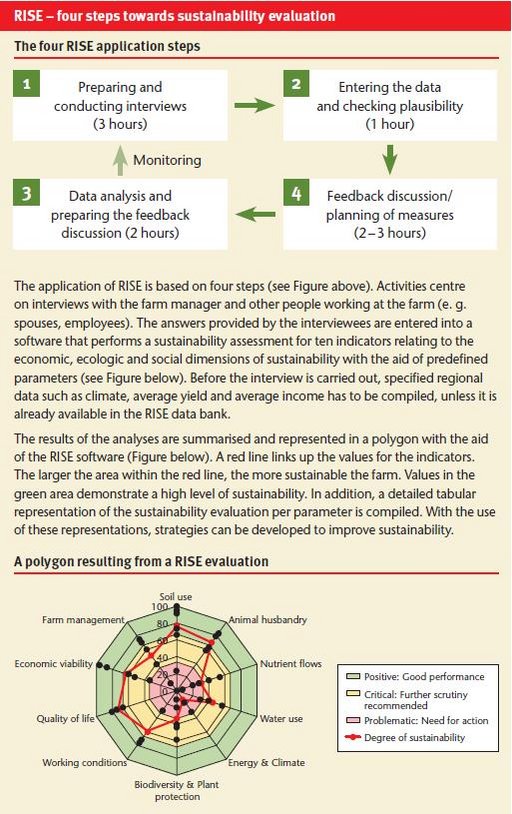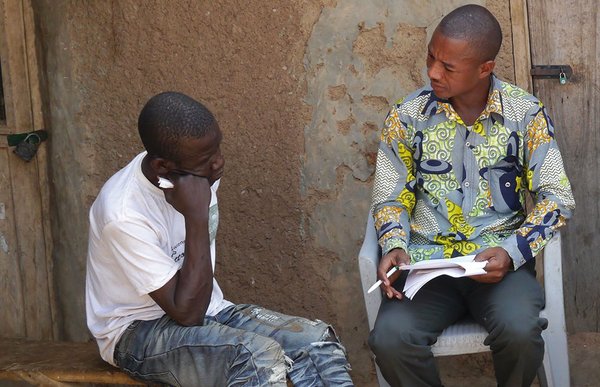 Download this article in magazine layout
Download this article in magazine layout
- Share this article
- Subscribe to our newsletter
Tangible sustainability
Nowadays, there is general agreement that only sustainable agriculture will be capable of feeding the world’s population without destroying the environment and the natural resources. However, opinions are divided on what sustainable agriculture should look like. Everyone, ranging from grassroots organisations through farmers’ federations to the manufacturers of pesticides and fertilisers, claims to be supporting sustainable agriculture. To some, only organic and /or smallholder agriculture is sustainable, whereas others also include industrialised agriculture.
The reason why these views diverge is that sustainability is defined in different ways and different priorities are set. For example, the emphasis may be more on ecological criteria or more on economic criteria. This is why various initiatives are trying to enable an optimally objective and generally applicable evaluation of sustainability. One of these initiatives was started by the Swiss School of Agricultural, Forest and Food Sciences (HAFL) and has resulted in the development of the so-called Response-Inducing Sustainability Evaluation (RISE). RISE has been in use since 2000, and has been applied by various organisations to hundreds of small, medium-sized and large farms. The method has already been applied in five continents, also among large numbers of family farms in developing countries. Commissioned by the German Federal Ministry for Economic Cooperation and Development (BMZ), GIZ has been working with RISE since 2012, too. For this purpose, it has acquired a licence from HAFL, and several staff have been trained to use the method.
One method for all farms
The aim of RISE is to make the sustainability of production more measurable and communicable. The examination focuses on the farm. RISE evaluates the ecological, social and economic dimensions of sustainability. The indicators used have been derived from the sustainability definitions of the United Nations Food and Agriculture Organization (FAO) as a well as a large number of scientific publications on the topic. This enables a by and large objective and holistic evaluation of sustainability.
RISE has not been conceived for the certification of farms but supplies the foundations for agricultural advice. The farms interviewed are given a written assessment of their sustainability and recommendations for action. By examining a group of representative farms, development projects can identify deficits and develop appropriate project or advisory strategies for a larger number of farms in a given region.
By using reference and standard values, no special measurements are required for the application of RISE as a rule; all results are based on interviews. The method can be applied to any farm, regardless of its size, level of commercialisation and location. Each farm that has been examined receives swift feedback on the results that is combined with suggestions for improvements. Thus the farm manager benefits directly and can, should the need arise, introduce measures to improve sustainability. For each farm, a full day is required for the interview and the feedback discussion.

RISE in German development co-operation
So far, GIZ has applied RISE in seven countries: Bolivia, Nicaragua, Zimbabwe, Ghana, Kirgizstan, Ecuador and Tunisia. The extent of examinations and the use of the results vary considerably. As yet, the most extensive operation has taken place in Bolivia, where more than 200 representative farms were analysed in an agricultural development programme. For this purpose, project staff and agricultural extension employees were trained at local level in applying RISE. The results were made use of to focus advice for the targeted enterprises on the important problems. If RISE is applied repeatedly, it can also be used for monitoring.
The example of RISE application in the context of German development co-operation so far shows that farms in a certain region often demonstrate similar patterns, so that the number of samples can be kept small. Even though family farms have been examined in most cases, sustainability levels are often poor. This is what the development projects address, and they offer targeted support. In addition to advisory services for farms, RISE can also supply valuable details for policy consulting. For example, if all enterprises in a region demonstrate poor sustainability regarding certain parameters, this may be an indicator for unfavourable framework conditions.
Potential for improvements
Even though RISE can be a great help for farms, agricultural extension services and development co-operation projects, applying the method in practice still presents a number of challenges. The HAFL has compiled a Code of Conduct to ensure quality in the application of RISE. For example, to apply the method, users have to be trained by HAFL, and its first use in the field must be accompanied by a HAFL staff member – this ensures a high standard in the application of RISE, but represents a fairly elaborate procedure. Also, given that HAFL capacities are limited, alternative training models are currently being discussed. However, the biggest problem that users refer to is the large amount of time that the method requires. In addition, many farmers refuse to reveal confidential income and asset details. And yet it is this information that plays an important role in assessing economic sustainability. Moreover, some of the RISE questions do not seem to be sufficiently adapted to smallholder agriculture in developing countries. Based on feedback from the practical application of RISE, the HAFL is continuously improving the method.
Alexander Schöning
alexander.schoening@giz.de
Alberto Camacho
Alberto.camacho-henriquez@giz.de
Deutsche Gesellschaft für
Internationale Zusammenarbeit (GIZ) GmbH





Add a comment
Be the First to Comment